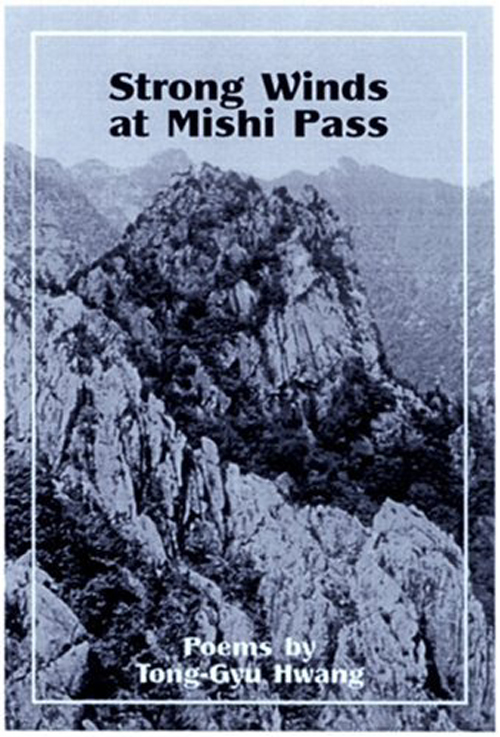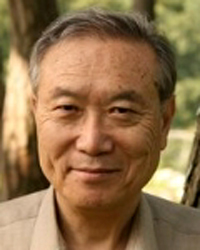-
 Korea.net's 24-hour YouTube channel
Korea.net's 24-hour YouTube channel- NEWS FOCUS
- ABOUT KOREA
- EVENTS
- RESOURCES
- GOVERNMENT
- ABOUT US
Oh wind!
Without a wrinkle to grasp on the surface of the earth,
Without a single tree or bush or grass on which to cling
Without a phrase of the sacred Book with which to live,
I swayed on Mishi Pass
The whole landscape swayed in the wind,
As if it were wind itself,
Mt. Sorak swayed,
My backbone swayed, too.
I struggled to keep from blowing away,
Holding myself in my arms.
(ellipsis)
Strange!
The wind begins to blow again.
The trees begin again to sway.
So do the signboards and the roadside trees.
The trees in Kangwon roar in pleasure.
The wind blows stronger each time.
Finally leaving my imagination behind.
Ah, this earth.
Strong winds at Mishi Pass.
From Hwang Tong-gyu’s “Strong Winds at Mishi Pass”
“Strong Winds at Mishi Pass," the 1993 collection of poems by Hwang Tong-gyu, one of the most celebrated living Korean poets, is regarded as having paved the way for the emergence of “drama lyrics” in Korea.
The poems featured in the volume are themed on the strong winds blowing at Mishi Pass, a pass 826 meters above sea level in Goseong-gun, Gangwon-do (Gangwon Province). The pieces focus on the transience of life and longing for freedom.
“Most of lyric poetry focuses more on emotional status such as love, sorrow and anger, whereas drama lyrics give priority to creating a dramatic emotional change in the poet and the readers,” explained poet Hwang.
“It is like omija wine, an alcohol made of schizandra fruit, for example. I mean, if one loves the colors and the taste of omija wine, a glass of the wine will make the drinker feel better and lead him to let go of animosity against someone whom he has hated. The lyric poetry has such effect.”

The English edition features Hwang’s two other well-known collections of poems, “Journey to Morundae” and “Wind Burial Poems.”
The “Journey to Morundae” series, published in 1991, is set at Morundae Cliff, a cliff jutting out in Jeongseon-gun, Gangwon-do. The great pieces were inspired by how the poet felt about the natural beauty and gorgeous surroundings of the cliff during his journey to the site.
Morundae Mountain was absolutely calm.
I could hear pollen falling on the river.
I sat there, not realizing it was getting dark.
A bird eyes me suspiciously while flying by.
Mosquitoes randomly bit me.
(Love of something fresh and raw!)
Sitting there, completely drenched,
I wasn’t lonely at all.
From “Journey to Morundae”
Another series of poems, “Wind Burial Poems,” showcases Hwang’s unconventional approach to the topic of “death,” a subject that could otherwise sound somewhat serious and heavy. Rather than focusing on the solemnity and distress that someone on the verge of death might feel, Hwang emphasizes in his poems that, “Death is something that will lead you to the point where you feel comfortable and feel free."
A drop of water
Falls to the ground.
How spectacular it would be
If my camera caught that moment!
(If only my mind could stop time!)
It splashes instantly,
Creating a crown
Or spreads like thin fog across the garden
Inducing, in the flowers, thirst.
When the water comes toward earth,
Every drop is thrilling
It falls like a ripe apple
Bouncing in ecstasy.
Rolling slowly over,
It lies down peacefully.
From “Wind Burial 17”
 Poet Hwang Tong-gyu started writing poems when he was just a middle school student. Hwang graduated from Seoul High School and then entered Seoul National University, majoring in English Language and Literature. In 1958, when he was a sophomore at university, he made his literary debut when some of his poems, including “October” and “A Letter of Delight,” were recognized by one of the greatest poets in Korean literature, Seo Jeong-ju.
Poet Hwang Tong-gyu started writing poems when he was just a middle school student. Hwang graduated from Seoul High School and then entered Seoul National University, majoring in English Language and Literature. In 1958, when he was a sophomore at university, he made his literary debut when some of his poems, including “October” and “A Letter of Delight,” were recognized by one of the greatest poets in Korean literature, Seo Jeong-ju.
My thoughts of you always involve something trivial,
Such as a moment with the sun setting somewhere behind where you sit
And the wind blowing,
But by that triviality, long transmitted from some moment when you wandered in infinite misery,
I will summon you.
From “A Letter of Delight”
The poem, which he wrote in high school, has remained one of the most beloved love poems of young people. Since serving as English Literature Professor at his alma mater in 1968, the poet has published a total of 15 collections of poems.
Hwang is known as a poet who finds something marvelous from something trivial, and also as a tireless traveler who finds themes for his works in the places he travels.
Known as the oldest son of Hwang Sun-won, Korea’s literary colossus, Hwang also has a daughter who herself is a writer with publications of a series of essays from a couple of years ago. With this, three generations of the Hwang family have gotten involved in literature.
By Sohn JiAe
Korea.net Staff Writer
jiae5853@korea.kr
Without a wrinkle to grasp on the surface of the earth,
Without a single tree or bush or grass on which to cling
Without a phrase of the sacred Book with which to live,
I swayed on Mishi Pass
The whole landscape swayed in the wind,
As if it were wind itself,
Mt. Sorak swayed,
My backbone swayed, too.
I struggled to keep from blowing away,
Holding myself in my arms.
(ellipsis)
Strange!
The wind begins to blow again.
The trees begin again to sway.
So do the signboards and the roadside trees.
The trees in Kangwon roar in pleasure.
The wind blows stronger each time.
Finally leaving my imagination behind.
Ah, this earth.
Strong winds at Mishi Pass.
From Hwang Tong-gyu’s “Strong Winds at Mishi Pass”
“Strong Winds at Mishi Pass," the 1993 collection of poems by Hwang Tong-gyu, one of the most celebrated living Korean poets, is regarded as having paved the way for the emergence of “drama lyrics” in Korea.
The poems featured in the volume are themed on the strong winds blowing at Mishi Pass, a pass 826 meters above sea level in Goseong-gun, Gangwon-do (Gangwon Province). The pieces focus on the transience of life and longing for freedom.
“Most of lyric poetry focuses more on emotional status such as love, sorrow and anger, whereas drama lyrics give priority to creating a dramatic emotional change in the poet and the readers,” explained poet Hwang.
“It is like omija wine, an alcohol made of schizandra fruit, for example. I mean, if one loves the colors and the taste of omija wine, a glass of the wine will make the drinker feel better and lead him to let go of animosity against someone whom he has hated. The lyric poetry has such effect.”

Hwang Tong-gyu’s 1993 collection of poems, “Strong Winds at Mishi Pass,” has been published in English for a global audience.
The English edition features Hwang’s two other well-known collections of poems, “Journey to Morundae” and “Wind Burial Poems.”
The “Journey to Morundae” series, published in 1991, is set at Morundae Cliff, a cliff jutting out in Jeongseon-gun, Gangwon-do. The great pieces were inspired by how the poet felt about the natural beauty and gorgeous surroundings of the cliff during his journey to the site.
Morundae Mountain was absolutely calm.
I could hear pollen falling on the river.
I sat there, not realizing it was getting dark.
A bird eyes me suspiciously while flying by.
Mosquitoes randomly bit me.
(Love of something fresh and raw!)
Sitting there, completely drenched,
I wasn’t lonely at all.
From “Journey to Morundae”
Another series of poems, “Wind Burial Poems,” showcases Hwang’s unconventional approach to the topic of “death,” a subject that could otherwise sound somewhat serious and heavy. Rather than focusing on the solemnity and distress that someone on the verge of death might feel, Hwang emphasizes in his poems that, “Death is something that will lead you to the point where you feel comfortable and feel free."
A drop of water
Falls to the ground.
How spectacular it would be
If my camera caught that moment!
(If only my mind could stop time!)
It splashes instantly,
Creating a crown
Or spreads like thin fog across the garden
Inducing, in the flowers, thirst.
When the water comes toward earth,
Every drop is thrilling
It falls like a ripe apple
Bouncing in ecstasy.
Rolling slowly over,
It lies down peacefully.
From “Wind Burial 17”

Poet Hwang Tong-gyu
My thoughts of you always involve something trivial,
Such as a moment with the sun setting somewhere behind where you sit
And the wind blowing,
But by that triviality, long transmitted from some moment when you wandered in infinite misery,
I will summon you.
From “A Letter of Delight”
The poem, which he wrote in high school, has remained one of the most beloved love poems of young people. Since serving as English Literature Professor at his alma mater in 1968, the poet has published a total of 15 collections of poems.
Hwang is known as a poet who finds something marvelous from something trivial, and also as a tireless traveler who finds themes for his works in the places he travels.
Known as the oldest son of Hwang Sun-won, Korea’s literary colossus, Hwang also has a daughter who herself is a writer with publications of a series of essays from a couple of years ago. With this, three generations of the Hwang family have gotten involved in literature.
By Sohn JiAe
Korea.net Staff Writer
jiae5853@korea.kr
Most popular
- First hearing-impaired K-pop act hopes for 'barrier-free world'
- Expats could account for 7% of population in 20 years: report
- 'Mad Max' director impressed by 'cinema-literate' Korean viewers
- Show in Italy to present 'thought-filled' Korean craftworks
- Romanian presidential couple visits national cemetery













